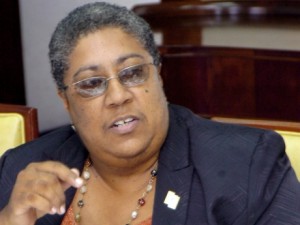Jamaica ‘has never carried out a blood test’, according to former anti-doping chief
Former head of the Jamaica Anti-Doping Commission (JADCO) Renee Ann Shirley went on the offensive once again by attacking the organisation in another stinging criticism.
In a report in The Telegraph in the United Kingdom, Shirley claims the organisation has never conducted a blood test and is so short-staffed that it risks botching its prosecutions of accused athletes when they face drug hearings starting later this year.
 Shirley is claiming that blood-testing kits that were delivered during her tenure at JADCO have never been used.
Shirley is claiming that blood-testing kits that were delivered during her tenure at JADCO have never been used.
Instead, she says Jamaican athletes are subject only to urine tests by JADCO, even though blood-testing is the only way to detect the presence of human growth hormone (hgh) – a substance that could be of particular advantage to sprinters.
“Why have they not started doing blood tests and looking for things like HGH?” Shirley said. “I know that 30 kits were bought and I left them there. To the best of my knowledge, eight months later I don’t know if Jamaica has started doing blood tests.
“When you look at the IAAF [International Association of Athletics Federations] statistics, I think they said they did nine blood tests last year on Jamaican athletes, so it’s not a lot of blood-testing.”
Shirley’s comments are unlikely to endear her to many Jamaicans who have accused her of trying to tarnish Jamaica’s international reputation by going to the international media with her accusations.
JADCO’s chairman Dr. Herb Elliot has previously questioned the accuracy of her claims and described her as “demented” and “a Judas”.
But Shirley says she is undaunted by the personal attacks, insisting they are “washing off my back”, and is refusing to back down.
On Tuesday, Olympic taekwondo player Kenneth Edwards became the eighth Jamaican athlete to test positive this year when he failed a drug test for a banned diuretic.
Jamaican international footballer Jermaine Hue was banned for nine months last month for testing positive for a steroid, while Powell and Simpson, who deny knowingly taking any stimulants, and three-time Olympic champion Veronica Campbell-Brown were among six track and field athletes who failed tests.
Campbell-Brown was handed only a public reprimand by her Jamaican disciplinary panel earlier this month, though the IAAF’s doping review panel is due to meet in the coming days to consider whether to appeal.
Shirley said that with so many disciplinary hearings stacking up – Powell and Simpson will answer charges they that took a banned stimulant in January, while three other field athletes will have hearings in December – she feared that JADCO could be overwhelmed by the caseload.
She said: “We have a number of doping positives which are going to need to be managed because JADCO has to manage the results process and put the cases together to go to the hearings. My concern is that the staff is not in place to do this job and nobody is addressing this issue. This process must be managed and cases have to be put together with witness statements.
“In Jamaica, we can’t afford for people to get off on a technicality because there was some breach in the processing of the paperwork.”
She added: “The Asafa Powell situation is also compounded by the criminal investigation that was going on in Italy. The details of the case are going to have to come forward and it’s going to have to be rigorously handled.
“On the legal side, JADCO is going to have to present a case – what was found, all the details – and it needs to stand scrutiny in the eyes of the world because everybody’s going to be watching.”
Asked whether she believed Powell could escape with a lenient sanction or even no punishment at all if JADCO failed to present a proper case, Shirley said: “Let me put it this way. Starting with Veronica Campbell-Brown, I’m waiting with interest to see what the technical committee at the IAAF has to say about her being given a warning.
“It should have been a two-year ban and, typically, for you to get a reduction you have to show ‘exceptional circumstances’. So it will be interesting to see what happens.”
Shirley, who is now involved in setting up a not-for-profit teaching foundation and describes herself as “semi-retired”, says Jamaica needs a world-class anti-doping programme to ensure that clean athletes are not tainted by suspicion.
“People say to me that we’re poor and we don’t have the money to do it,” she said. “But then how come they’re sending all these officials and others around the world to cheer the athletes on, and how come they have these big celebrations at home?
“It’s a matter of priority. I went around the place trying to make people understand that this is big business. This is not something that should be taken lightly.”
Shirley, JADCO’s executive director from July 2012 until February this year, has already prompted an investigation into Jamaica’s anti-doping programme by the World Anti-Doping Agency following her revelation in a magazine article that JADCO carried out just one out-of-competition drug test in the five months leading up to the London Olympics.
If you like this article please consider joining our Forum HERE to help us grow.
Remember to share this article on Facebook and other Social Media Platforms. Subscribe to our mailing list to get new articles sent to you automatically.

